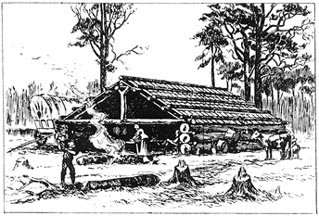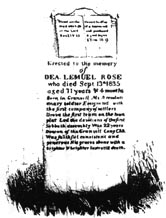
The First House in Granville, Ohio.
|
sermon contained statements of the work done under his direction which deserve reproduction as showing the life of a minister in a small town. Not confined to his room for a single day for sixty-eight years, during these fifty years of his pastorate he preached over seven thousand sermons, taught over fourteen hundred Bible class lessons, trained for higher education or for business eight hundred pupils, followed to the grave over six hundred persons, living to preach the funeral discourse in memory of the last survivor of the members of the church at the time of his settlement. His paternal care over the community is evinced by the sentence: "Five times I have by previous appointment performed a visitation of the entire parish, making a record of the name and age of each individual, conversing and praying with parents and children." Six times a year for fifty years he met with his people about the communion table, barring only a season of four months, when he made a visit to Granville, Ohio. Two hundred and forty-tour times he solemnized marriages, his social duties attending the people from the cradle to the grave.

Dea. Lemuel Rose, who died Sept. 13, 1835.
|
Outside his parish he frequently attended ecclesiastical councils, where his influence was persuasive; and for many years Williams College received the benefit of his wisdom upon its Board of Trustees.
One whose home is filled with traditions of the man paints a picture of the Sabbaths under his ministry:
"Would that I could embalm all the memories which have come to me by inheritance; the quiet Sundays with morning and afternoon sermons; the fragrant odor of caraway and fennel; the pleasant chats at noon over the lunches; Dr. Cooley preaching in the great, high, old-fashioned pulpit, his aged and blind father sitting near; the square pews in which the congregation was seating according to their age; the unruly boys in the gallery under the watchful eye of the tithingman; the deacons in their seats facing the congregation. I can see 'Squire James Cooley as he came to the meeting, his pockets stuffed with letters to be delivered after service, -- wonderful old letters folded carefully into shape and sealed with red wax, a necessity then, and not a mere fashion. I can see Mr. Jesse Spelman rising with his tuning fork to start the hymns, for there was no organ then. I can see the long rows of teams outside, and the busy scene when the people made ready to go home."
— page 103 —
|

